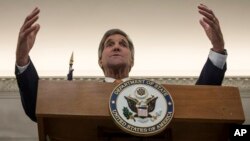Secretary of State John Kerry is in Jordan, where he meets Saturday with Palestinian leader Mahmoud Abbas as part of an effort to defuse tensions between Israel and the Palestinians.
The talks come two days after Kerry met with Israeli Prime Minister Benjamin Netanyahu in Berlin. Afterwards, Kerry said that meeting gave him a “cautious measure of optimism” that steps are available to ease tensions.
In the past few weeks, at least 10 Israelis and nearly 50 Palestinians have been killed in the spiraling unrest.
On Friday, military officials said Israeli troops shot a Palestinian after he stabbed a soldier near the Jewish settlement of Gush Etzion, south of Jerusalem.
Some of the unrest has stemmed from Palestinian concern about access to the Al-Aqsa compound, a holy site known to Muslims as the Noble Sanctuary. Jews also revere the site as the Temple Mount.
Quartet condemns Israeli-Palestinian violence
Before departing Vienna for the Jordanian capital Friday, Kerry took part in a meeting of the Middle East Quartet – a group of senior officials from the U.S., Russia, EU and the U.N.
Afterwards, the Quartet urged Israel and the Palestinians to show "maximum restraint" and avoid provocative acts.
The group expressed "grave concern" and said it would send envoys to the region to encourage concrete actions that show a "genuine commitment to pursuing a two-state solution."
It called on Israel to work with Jordan to "uphold the status quo" at holy sites in Jerusalem in accordance with Jordan's peace treaty with Israel.
Jordan’s Foreign Minister Nasser Judeh called the unrest surrounding Jerusalem’s holy sites a “tinderbox” that could “throw the whole region, if not the world into disarray.”
He said he hoped the new cycle of violence would provide a “silver lining” – the resumption of peace talks between Israel and the Palestinians.
Judeh commented in Vienna Friday, where he had joined Kerry and the foreign ministers of Russia, Turkey and Saudi Arabia for talks on Syria’s civil war.
Ban calls unrest 'troubling'
At the United Nations, U.N. Secretary-General Ban Ki-moon said the recent unrest is "profoundly" troubling" and "utterly unacceptable."
Ban was back in New York after an emergency visit to the region this week. He said all sides agreed on the need to reduce tensions and avoid action that would further fuel the unrest.
In a move seemingly aimed at easing tensions, Israel lifted age restrictions on Muslim worshippers at a sensitive East Jerusalem holy site for the first time in weeks. Peace prevailed during and after Friday prayers at the Al-Aqsa mosque.
Under restrictions imposed after clashes erupted in mid-September, young Muslim men were barred on Fridays from entering the Al-Aqsa compound.
Under long established rules, Israel is responsible for security at the site and governs access to the compound, while a Jordanian-run Islamic society maintains administrative control of the site.
Israel denies any plans to change the status quo at the mosque compound. On Friday, an Israeli police spokesman said the decision to lift the age restriction followed a security assessment.
The Israeli-Palestinian unrest and the crisis in Syria have been dominant themes for Kerry during his four-nation tour of Europe and the Middle East.
In addition to meeting with President Abbas on Saturday, Kerry will meet with Jordan’s King Abdullah before traveling to Saudi Arabia for talks with officials, including Saudi King Salman.













